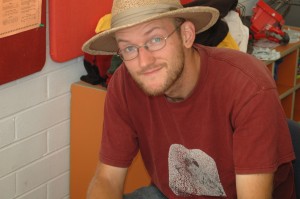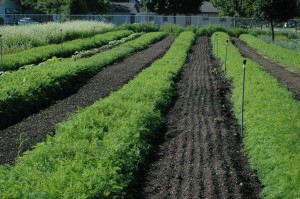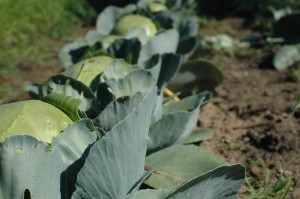Here is a short essay written by Gary Benson, our Eighth Day Farm intern. Gary’s degree is in Computer Science and he brings a unique perspective to the farming process. This essay was recently published in our weekly newsletter, but we had such an overwhelming response, we thought we’d share it with those who do not currently receive our newsletter.
 “Having come from a lifetime of study, work, and play in computer science to a summer interning at Eighth Day Farm, I’ve learned that ecological farming doesn’t have much in common with computer programming, and that God is more farmer than programmer.
“Having come from a lifetime of study, work, and play in computer science to a summer interning at Eighth Day Farm, I’ve learned that ecological farming doesn’t have much in common with computer programming, and that God is more farmer than programmer.
A computer programmer solves a problem by dividing it into smaller and smaller problems, as isolated from one another as possible, until each is so small as to have an obvious solution. A program is judged on the degree to which these tiny solutions are cohesive (each serves one and only one well-defined purpose), loosely-coupled (they depend minimally on each other), and encapsulated (the specific inner workings of each are hidden from outside view, such that they can be abstracted out of relevance). These properties make it easy to, for instance, swap out a component with another compatible one, or test and debug a portion of the program in isolation.
 While this strategy works well enough in the realm of computer science (which was built from the ground up from logic), it is the same strategy which, applied to people and creatures, has caused the disaster of industrial farming. In the industrial farming system, each participant is given one cohesive, loosely-coupled, and encapsulated role, in which it is expected to behave as a machine, accepting inputs and returning outputs. Cornfields take in fertilizer, seed, and pesticides, and output corn. Beef cattle take in calories and protein, and output meat. Slaughterhouse kill floor workers take in live animals and unlivable paychecks, and output dead animals. That’s their one well-defined job, its details eagerly concealed from public view by the agribusiness corporations. The workers are easily replaced, as they are an abstract part of the machine, and one is functionally the same as any other.
While this strategy works well enough in the realm of computer science (which was built from the ground up from logic), it is the same strategy which, applied to people and creatures, has caused the disaster of industrial farming. In the industrial farming system, each participant is given one cohesive, loosely-coupled, and encapsulated role, in which it is expected to behave as a machine, accepting inputs and returning outputs. Cornfields take in fertilizer, seed, and pesticides, and output corn. Beef cattle take in calories and protein, and output meat. Slaughterhouse kill floor workers take in live animals and unlivable paychecks, and output dead animals. That’s their one well-defined job, its details eagerly concealed from public view by the agribusiness corporations. The workers are easily replaced, as they are an abstract part of the machine, and one is functionally the same as any other.
In the wild, no creature can be reduced to a software component or machine. A squirrel, for instance, completely and specifically depends on oak trees, and serves manifold and incalculable purposes (not least of all the planting of oak trees). It cannot be replaced with any other creature, and cannot be observed in isolation from the rest of creation. Every tiny action of the squirrel effects uncontainable, unknowable consequences spiraling outward to the ends of the universe. (Through the lens of computer science, this kind of behavior is abhorrent and likely to cause a lot of headaches.)
 Rather than try to fight against the good and entirely un-machinelike properties of the creation, an ecological farmer designs a farm after the patterns of the ecological community, making each plant or animal useful and connected in as many ways as possible. For example, Joel Salatin (a well-known organic farmer in Virginia) has his laying hens eat the grubs out of the cow pies of his beef cattle, sanitizing the pasture for the cattle and providing a valuable source of protein for the hens. Rather than an engineer, piecing machines together into a larger machine, he is the conductor of an orchestra, coordinating the parts of free, interdependent agents into song.
Rather than try to fight against the good and entirely un-machinelike properties of the creation, an ecological farmer designs a farm after the patterns of the ecological community, making each plant or animal useful and connected in as many ways as possible. For example, Joel Salatin (a well-known organic farmer in Virginia) has his laying hens eat the grubs out of the cow pies of his beef cattle, sanitizing the pasture for the cattle and providing a valuable source of protein for the hens. Rather than an engineer, piecing machines together into a larger machine, he is the conductor of an orchestra, coordinating the parts of free, interdependent agents into song.
These things matter to me because I have always been a computer scientist, and now I am also an ecological farmer. In my journey these last two years I’ve been learning that my life is not a computer program – it cannot be divided and compartmentalized into independent pieces like “my professional life”, “my family life”, “my creative life”, or worst of all, “my spiritual life”. Likewise it is good and healthy to be “tightly-coupled” with those around me, in a dance of deep mutual dependence. It is good to be unencapsulated, exposing the inner workings of my heart to any who care to look. It’s good to be a Creature – a full and willing participant in the garden of Creation.
Being more animal than machine is easier said than done. I am endlessly bitter and prideful, petty and stingy with love. Despair and cynicism bring me again and again to the verge of spiritual isolation, of becoming a self-contained piece of software, sharing and interdepending minimally with others. But fortunately there is a masterful farmer who seeks to bring our hearts into harmony: with themselves, with each other, with creation, and with the farmer Himself. And as we are farmed by Him, becoming less machine and more creature, we also become less programmer and more farmer. In this day-by-day miracle, imperceptible as the growth of plants, we transform into His likeness.”

One thought to “Guest Blogger Wednesday: Computer Science and Farming”
Hi Gary. I really enjoyed reading this piece. I’ve taken a similar path in life and I spend much time digesting the same problems. I received a bachelors in mathematics, took a two year hiatus growing vegetables on an organic farm, and now I’m studying for a degree in computer science.
As wonderful as technology can be, it’s paralyzing to think of the of the detrimental impact it’s having on the earth. On a good day I tend to think humanity will reconcile age old wisdom of simple living and ecologically minded stewardship with new communication technologies to spread and share stories and techniques for sustainable living. On bad days I’m afraid the “machine” is a runaway train and sustainable use of emerging technologies is a pipe dream created by the techno-industrial machine.
Anyway, I think the verdict is still out. I hope you find ways to combine your skillsets for the betterment of our community and I wish you luck on your journey.
Bowie
Comments are closed.